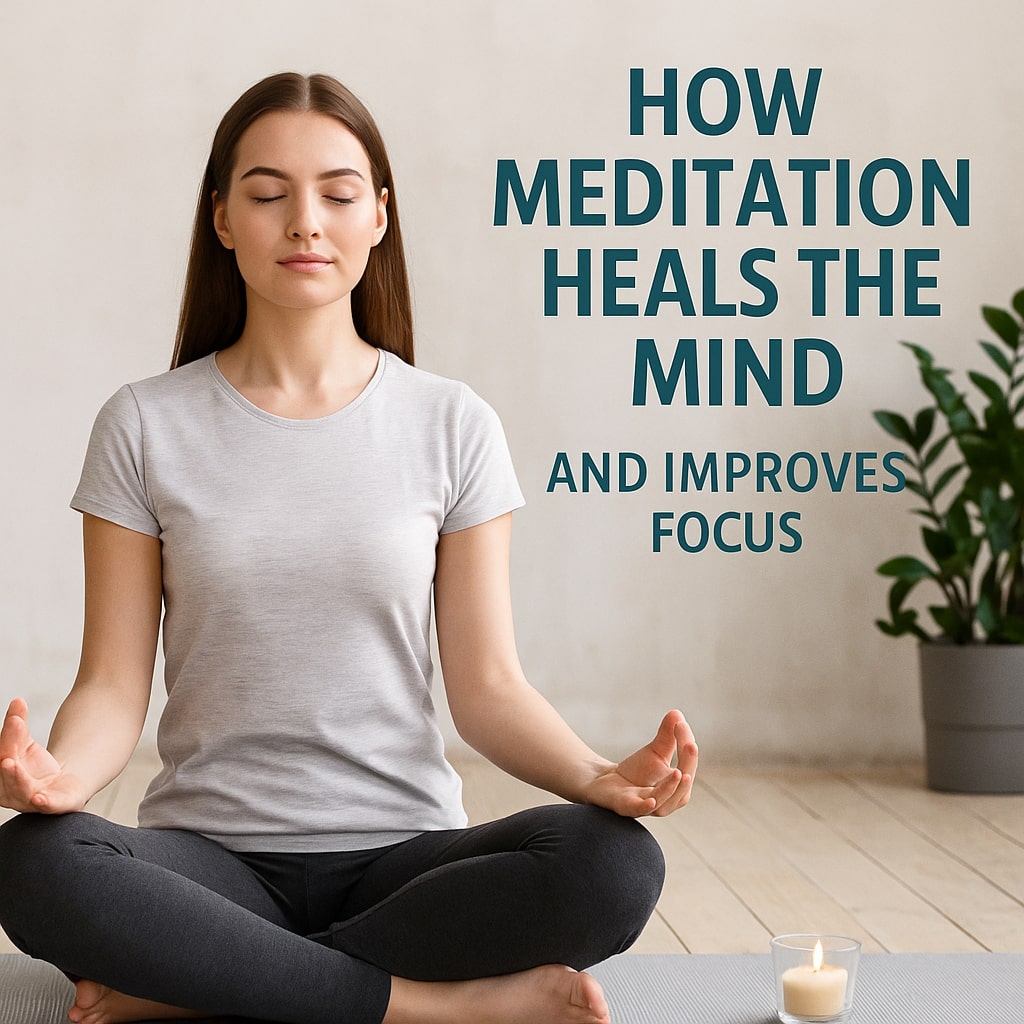How Meditation Heals the Mind and Improves Focus
In today’s fast-paced world, our minds are constantly buzzing—from notifications and deadlines to endless thoughts that refuse to slow down. It’s no surprise that people now struggle with stress, anxiety, poor concentration, and emotional burnout more than ever before. But what if the solution to mental peace and sharp focus lies not in a pill, a supplement, or a productivity hack… but simply in the power of meditation?
How Meditation Heals the Mind and Improves Focus. Meditation is one of the oldest healing techniques on Earth. For thousands of years, sages, monks, healers, and even warriors practiced meditation to control the mind, purify emotions, and unlock hidden mental strength. Today, modern science has confirmed what ancient wisdom knew all along:
Meditation reshapes the brain, heals the mind, reduces stress, and enhances focus.
In this detailed guide, we’ll explore how meditation heals the mind, why it improves focus, the science behind it, and how you can easily start your own meditation practice to experience these benefits.
1. What Is Meditation? (And Why It’s Not What You Think)
Many people think meditation means:
- Sitting with eyes closed
- Emptying the mind
- Stopping thoughts
- Sitting still for long hours
But meditation is much simpler.
Meditation is the practice of bringing your attention, again and again, to the present moment—calmly, gently, without judgment.
You don’t need to stop thoughts.
You don’t need to sit like a monk.
You don’t need any special posture or perfection.
Meditation is about training the mind, just like exercise trains the body.
When you meditate regularly, the mind becomes:
- Calmer
- Clearer
- More focused
- Emotionally balanced
- More resilient
- Less reactive
This is how healing begins.
2. How Meditation Heals the Mind: The Science Behind Inner Peace
Meditation doesn’t just “relax” you—it changes your brain at a biological and structural level.
Here’s how:
2.1 Meditation Reduces Stress Hormones
Stress triggers the release of cortisol, the hormone that causes:
- Anxiety
- Irritation
- Brain fog
- Poor sleep
- High blood pressure
Meditation reduces cortisol levels, allowing the body to shift into a relaxed, balanced state. When cortisol stays low, the mind naturally becomes peaceful.
2.2 Meditation Strengthens the Prefrontal Cortex (Focus Center)
The prefrontal cortex is responsible for:
- Focus
- Decision-making
- Concentration
- Self-discipline
Regular meditation increases the thickness and activity of the prefrontal cortex.
This means:
✔ Sharper focus
✔ Better memory
✔ Faster processing
✔ Improved mental clarity
2.3 Meditation Shrinks the Amygdala (Stress & Fear Center)
The amygdala controls:
- Fear
- Worry
- Stress response
- Emotional reactions
Meditation reduces the size and activity of the amygdala.
This leads to:
✔ Less anxiety
✔ Better emotional control
✔ Reduced overthinking
✔ More calmness
2.4 Meditation Improves Emotional Stability
Meditation activates parts of the brain responsible for:
- Compassion
- Empathy
- Patience
- Self-awareness
You begin to respond, not react.
This heals emotional wounds and builds long-term emotional resilience.
2.5 Meditation Boosts Feel-Good Chemicals
Meditation naturally increases:
- Serotonin (happiness)
- Endorphins (pleasure)
- Melatonin (sleep)
- GABA (calmness)
This creates a deep sense of mental well-being—without side effects.
Daily Energy and Mental Calm
3. How Meditation Improves Focus: The Attention Workout
Modern life constantly distracts us—social media, notifications, stress, to-do lists. Our minds have become scattered, jumping from one thought to another.
Meditation is the antidote.
Here’s how meditation improves focus:
3.1 Meditation Reduces Mental Noise
When the mind is cluttered, we can’t concentrate. Meditation clears unnecessary thoughts and gives mental space to focus.
3.2 Meditation Increases Attention Span
Studies show that even 10 minutes of meditation a day improves the brain’s ability to stay focused for longer periods.
3.3 Meditation Strengthens Working Memory
Working memory is what you use when you:
- Study
- Work on tasks
- Analyze information
- Solve problems
Meditation sharpens this mental tool, improving overall cognitive performance.
3.4 Meditation Trains the Mind to Return to the Task
Every time the mind wanders during meditation and you gently bring it back—that is focus training.
Just as lifting weights builds muscles, bringing attention back builds concentration.
4. Emotional Benefits: How Meditation Heals the Heart and Mind Together
Healing is not only mental—it’s emotional too.
Meditation helps with:
- Stress reduction
- Anxiety relief
- Improved patience
- Better emotional control
- Reduced anger and frustration
- Increased self-confidence
- Inner peace and acceptance
Meditation teaches you to understand your emotions instead of fighting them.
5. Types of Meditation: Which One Is Best for You?
There are many beautiful forms of meditation. Choose what feels most natural.
5.1 Breath Awareness Meditation
Simple and highly effective.
Focus on your inhale and exhale.
Perfect for:
✔ Stress relief
✔ Beginners
✔ Improving focus
5.2 Mindfulness Meditation
Stay aware of your body, surroundings, and thoughts without judging them.
Perfect for:
✔ Emotional healing
✔ Anxiety reduction
✔ Calmness
5.3 Mantra Meditation
Chanting a word like “Om” or any sacred phrase calms the mind and increases concentration.
Perfect for:
✔ Deep focus
✔ Spiritual growth
5.4 Guided Meditation
A teacher or audio guides you step-by-step.
Perfect for:
✔ Beginners
✔ People with overthinking
✔ Sleep meditation
5.5 Loving-Kindness Meditation (Metta)
Focuses on compassion, forgiveness, and emotional healing.
Perfect for:
✔ Heart healing
✔ Reducing anger
✔ Increasing empathy
6. How to Start Meditating: A Step-by-Step Guide for Beginners
Here is a simple method you can start today.
Step 1: Find a Quiet Space
Sit comfortably.
You can sit on a chair, bed, or on the floor—whatever feels natural.
Step 2: Relax Your Body
Loosen your shoulders, jaw, and hands.
Let go of tension.
Step 3: Focus on Your Breath
Breathe in deeply…
Breathe out slowly…
Feel your breath entering and leaving the body.
Step 4: Allow Thoughts to Come and Go
Don’t try to stop your thoughts.
Let them flow like clouds passing in the sky.
Step 5: Bring Attention Back Each Time
Each time your mind wanders, gently return to the breath.
This is the true magic of meditation.
Step 6: Start with 5 Minutes
Gradually increase to:
- 10 minutes
- 15 minutes
- 20 minutes
Consistency matters more than duration.
7. Daily Meditation Routine to Improve Focus
Here’s a simple schedule:
Morning Meditation (5–10 minutes)
Boosts clarity, sets positive tone for the day.
Midday Mindful Breathing (2 minutes)
Breaks mental fatigue and improves focus.
Evening Meditation (10 minutes)
Relieves stress and prepares the mind for deep sleep.
8. Common Myths About Meditation Debunked
Let’s clear up the biggest misunderstandings.
Myth 1: You must stop thinking
Truth: Thoughts are normal; meditation teaches you to observe, not stop them.
Myth 2: Meditation is for spiritual people only
Truth: Meditation is for everyone—students, professionals, parents, entrepreneurs.
Myth 3: I don’t have time
Truth: Even 5 minutes creates a huge difference.
Myth 4: Meditation works instantly
Truth: It works gradually, like exercise.
For more health benefits to check out this blog
9. Real-Life Benefits People Experience
People who meditate daily report:
- Better mood
- Greater patience
- Higher productivity
- Less anxiety
- Improved sleep
- Stronger memory
- Better relationships
- Higher energy levels
Meditation becomes a mental recharge that improves every area of life.
10. How Long Does It Take to See Results?
You may notice benefits within:
- 1–5 days → calmer mind
- 2 weeks → better focus
- 1 month → reduced anxiety
- 3 months → improved emotional balance
- 6 months → deep transformation
FAQ –
1. How does meditation actually heal the mind?
Meditation heals the mind by calming the nervous system and reducing the constant stream of thoughts. When you meditate, your brain shifts from the stress-driven “fight or flight” mode to a relaxed, restorative state. This lowers cortisol (stress hormone), improves emotional stability, and increases the brain’s ability to regulate thoughts and reactions. Over time, meditation rewires the brain, making you more resilient, peaceful, and mentally clear.
2. Can meditation really improve focus and concentration?
Yes, absolutely. Meditation strengthens the prefrontal cortex—the part of the brain responsible for focus, decision-making, and attention. Regular practice trains your mind to stay in the present moment, reduces mental distractions, and sharpens concentration. Many students, professionals, and entrepreneurs use meditation as a tool to increase productivity and mental performance.
3. How long should I meditate to see results?
Even 5–10 minutes a day can create noticeable changes within a few weeks. For deeper benefits like emotional healing, improved focus, and reduced anxiety, 15–20 minutes daily is ideal. Consistency matters more than duration, so start small and build your practice slowly.
4. What is the best time of day to meditate?
The best times are:
- Early morning (Brahma Muhurta) – mind is fresh and quiet
- Evening – releases stress accumulated during the day
However, the best time is the time you can follow consistently. Meditation works anytime as long as you are comfortable and distraction-free.
5. Do I need to sit cross-legged on the floor to meditate?
Not at all. You can meditate:
- On a chair
- On your bed
- On a sofa
- Even while walking (walking meditation)
What matters is a straight spine, relaxed body, and comfortable posture.
6. Why does my mind wander during meditation?
Because that’s what the mind naturally does!
Wandering thoughts do NOT mean you are doing it wrong. Meditation is not about stopping thoughts — it’s about redirecting your awareness gently whenever the mind drifts. With practice, your thoughts slow down and your focus deepens.
7. Can meditation reduce stress and anxiety?
Yes. Meditation reduces stress by calming the sympathetic nervous system and promoting relaxation. It also lowers cortisol levels and increases serotonin (the happiness hormone). Many scientific studies show that meditation is one of the most effective natural ways to manage anxiety.
8. Is meditation safe for everyone?
Yes, meditation is safe for almost everyone.
However, people with severe trauma, PTSD, or certain psychiatric conditions may benefit from guided meditation or practicing under a trained therapist. For most people, meditation brings calmness, clarity, and emotional balance.
9. What type of meditation is best for beginners?
Here are the easiest options to get started:
- Breath Awareness Meditation (focus on breathing)
- Body Scan Meditation
- Guided Meditation (audio)
- Mantra Meditation (“OM”, “So-Ham”, etc.)
- Mindfulness Meditation
Choose one that feels natural and enjoyable.
10. How long does it take to experience benefits?
Some benefits — like relaxation and reduced stress — are immediate.
For deeper mental clarity, improved focus, and emotional healing, most people see results within 21–30 days of consistent practice. The longer you practice, the stronger the benefits become.
Conclusion: Meditation Is the Medicine Your Mind Has Been Waiting For
Meditation is not just a practice; it’s a powerful tool for modern life.
It heals the mind by reducing stress, calming thoughts, and balancing emotions.
It sharpens focus by strengthening the brain’s attention centers.
Whether you’re looking to improve mental clarity, emotional well-being, or overall quality of life, meditation is one of the simplest and most effective practices you can start today.
You don’t need perfection.
Just start with one breath… and let the healing begin.
Disclaimer
This article is meant for educational and wellness purposes only. It should not replace professional medical advice, diagnosis, or treatment. Always consult a certified Ayurvedic or healthcare practitioner before starting any new health routine, especially if you have existing conditions or are pregnant.


